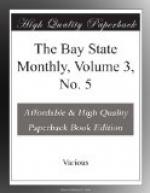Mr. Crapo’s first active part in politics was about a year after his admission to the bar. Fremont and Dayton were in 1856 nominated as the Republican candidates for the Presidency and Vice Presidency. Mr. Crapo was an earnest surporter of the candidates and made very effective speeches in their behalf in his section of the state. In the same year he was chosen to the Massachusetts House of Representatives, and the following year, when only twenty-seven years of age, was tendered a seat in the Massachusetts Senate, but declined the honor. His father this year removed to Michigan, and the son who remained became a worthy successor to the confidence and respect of his fellow-citizens. He was actively interested in the establishment of the New Bedford Water-works, and from 1865 to 1875 held the office of Chairman of the board of Water Commissioners. As Bank President, as director in extensive manufacturing corporations, and in other similar positions of trust and responsibility he acquired the reputation of being a sound business man, and an able financial manager. In all of these positions he has ever enjoyed the complete confidence and respect of his associates.
Mr. Crapo has been a diligent student of the history of the Old Colony and especially of the early settlement of Dartmouth, and he has rendered valuable contributions to the historical literature of the State. The address delivered by him at the Bi-Centennial Anniversary of the town of Dartmouth in 1864 and his address at the Centennial Celebration in New Bedford in 1876 exhibit his accurate research and his facility of clear and forcible expression. The closing sentences of the latter address were as follows:—–
“We must preserve the results of the past. But this is not our whole duty. The work of our fathers is not completed. Our honor and safety is in still further achievements of public justice and orderly freedom, and to the advancement of the common welfare. Our mission is a continuous and steady development of conscientiousness, a moral and religious growth, keeping pace with advancing intelligence, science and liberty. We attain to it by those common virtues which our fathers exercised: honesty, frugality, integrity and unfaltering devotion to duty. We need but follow the old plain paths, and, undazzled by the superficial glitter and pretentious show of ambitious self-seekers, march steadily forward to the attainments of a trained and vigorous virtue, to purity, strength and solidity. Thus will we keep unsoiled our inheritance, and transmit it, beautified and glorified, to those who come after us.
“We have seen the forest fall before the strong arm of the pioneer; we have seen the shores lined with masts, and the waters white with sails; we have seen the triumphs of restless, cunning labor; but not in physical power nor in populous cities, not in factories nor palaces, nor richly laden fleets, are the elements of natural greatness, nor its safety, but in the courage, integrity, self-denial and temperance of the people, and the spirit of mental enterprise and moral freedom which inspires them.”




